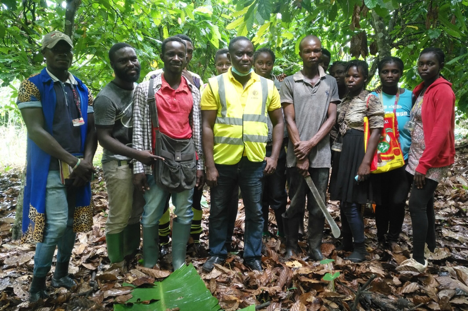As part of efforts to increase cocoa productivity to over one million metric tonnes, the Ghana Cocoa Board (COCOBOD) has commenced a hand-pollination exercise across all production areas for the 2019/2020 season.
COCOBOD has therefore increased recruited and trained youth for the human-induced cross-fertilisation programme from 20,000 in the previous season to 30,000. This was preceded by a mass-pruning exercise across the farms. COCOBOD targetted executing 100 percent pruning at every cocoa farm in the country. This was aided by the procurement and onward distribution of over 100,000 4T motorised pruner/slasher machines to farmers through their cooperatives.
The objective of hand pollination, one of COCOBOD’s Productivity Enhancement Programmes (PEPs), is to increase the number of pods on a cocoa tree to a minimum of 50. Criteria for selected farms in the exercise include hybrid farms, class of cocoa (8-20 years) farms, as well as surrounding farms free from the cocoa swollen shoot virus disease (CSSVD). Farmers must also be willing to apply fertilisers.
The hand-pollination exercise has been a game changer since it was introduced in 2017, and it is expected to further consolidate cocoa productivity gains in the country during the seasons ahead. Statistics from COCOBOD indicate that prior to the introduction of the programme, farmers averagely harvested between 3-5 bags (64kg) per acre. But yield per acre on hand-pollinated farms had soared to 25-30 bags.
Field visit
For effective supervision of the exercise to help COCOBOD meet the over one million m/t target, Mr. Emmanuel Fosu Nkueh – Berekum Cocoa District Extension Coordinator in the Bono Region, embarked on a field visit within his jurisdiction. The tour took him to Yawsae, a small farming community located on the shoulder of the Sunyani-Kenyasi road.
Interacting with the pollinators and farmers, Mr. Nkueh urged the hand-pollinators to work harder to justify the opportunity offered them as vessels to help increase cocoa productivity in the country, stressing that the Board will not hesitate to terminate the appointment of ‘lazy and unproductive’ workers.
“You must work harder for the farmers to appreciate the importance of hand-pollination in order to whet their appetite for embracing the programme. This is the role that you can play in changing the fortunes of poor cocoa farmers as a way of contributing your quota to national growth and development,” he said.
He added that hard-working and committed hand-pollinators will to be selected for subsequent activities like the pending cocoa rehabilitation exercise. He assured them that COCOBOD is working around the clock to provide them with all the requisite protective materials such as boots and rain-coats.
Mr. Nkueh also advised farmers to adhere to extension recommendations and other best farm management practices, to protect their investments from being ravaged by pests and diseases as well as to maximise productivity.
A 43-year-old farmer, Ishmael Kyere Aboagye, in an interview with the B&FT commended COCOBOD for the various interventions, especially hand-pollination and pruning. He said the interventions have boosted productivity significantly, and urged the Board to sustain PEPs. The farmer revealed that he used to harvest about 15 bags, but thanks to COCOBOD interventions productivity on his farm increased to 27 bags in the season gone by, and expressed optimism of harvesting about 40 bags in the coming season.










